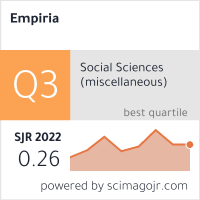La movilidad social en Buenos Aires y Montevideo de 1960 a 2012
DOI:
https://doi.org/10.5944/empiria.55.2022.34181Keywords:
Movilidad Social, Clases Sociales, Uruguay, Argentina, Social Mobility, Social ClassesAbstract
This work compares social mobility in Buenos Aires and Montevideo over a period of 50 years, based on the oldest and most recent social mobility surveys in each of them. The comparison is restricted to male heads of household, as they were the only ones included in the oldest data. Notwithstanding this limitation, the comparison is useful for future studies because it provides results for modeling data. Recent data comes from the EMOTE2 survey for Montevideo and the ENES 2012 of the PISAC project for Buenos Aires. Mobility data circa 1960 comes from ICPRS for Buenos Aires, and from works of the time for Montevideo, which allowed completing tables and distributions through Iterative Proportional Fitting. The hypotheses of the time and the most recent ones about these cities were reviewed, and they were channeled within the contemporary discussion that analyzes social mobility, which focuses especially on the association between class origins, educational achievements, and current class. Using loglinear models, hypotheses about constant fluidity, inequality of educational opportunities, and the return of educational capital were explored. Divergent changes and trends in class mobility and reproduction between the two cities were verified. Class inequality continues to dominate social mobility, but between both dates there is greater social fluidity in Buenos Aires than in Montevideo. The effect of class inequality is notable through how educational achievement is distributed and rewarded. No substantive advance of meritocracy is noted, and part of the problem is the mismatch of educational attainment and current class position. The conclusions contribute to a sequence of comparative studies that INCASI is developing. The results are interpreted as a counterpoint and dialogue with recent international trends.
Downloads
Downloads
Published
How to Cite
Issue
Section
License
Copyright (c) 2022 Empiria. Revista de metodología de ciencias sociales

This work is licensed under a Creative Commons Attribution-NonCommercial-ShareAlike 4.0 International License.
Los autores que publican en esta revista están de acuerdo con los siguientes términos:a) Los autores conservan los derechos de autor y garantizan a la revista el derecho de ser la primera publicación del trabajo al igual que licenciado bajo una Licencia Internacional Creative Commons CC BY-NC-SA 4.0.
b) Se permite y se anima a los autores a difundir electrónicamente las versiones pre-print (versión antes de ser evaluada) y/o post-print (versión evaluada y aceptada para su publicación) de sus obras antes de su publicación, ya que favorece su circulación y difusión más temprana y con ello un posible aumento en su citación y alcance entre la comunidad académica.










